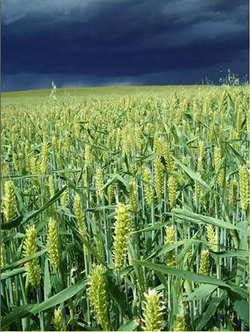 Photo: Ted Bahr According to a news release from BMO Financial Group dated April 26, 2012, the agriculture sector is poised for growth. What this really means, however, is Canadians can expect their grocery bills to increase in size in the upcoming growing season. The price of food has been rising steeply since at least July 2009 and now there are even more factors contributing to an increased load on our wallets. Fuel, chemical fertilizers, and increased demand are all adding to the upsurge in costs at the grocery store and of course the media is giving this scenario the “thumbs up,” because it looks good on paper. Sure some investors will be able to walk away with a few extra bucks, and maybe the odd farmer will see a slight increase in revenue, but only slight as their overhead costs will be higher and then, as usual, Canadian consumers will be left to pick up the tab. The “increased demand” arises out of the lifting of import restrictions in countries such as South Korea. Simply stated, our food is being shipped elsewhere, consuming copious amounts of fuel so that a few people can line their wallets, while the rest of the population in this country goes a little hungrier. So what can we do? Here are a few ideas we as Canadians can all participate in to overcome these challenges, and maybe even send a message: · Buy local. I hate to sound like a broken record on this one, but it definitely diminishes the fuel cost factor. · Eat Organic. Probably obvious considering the one of the main reasons for increasing prices is the cost of fertilizer production. If you think the cost of organic is more, that is not always the case. There are many deals to be found. Most vendors at local farmer’s markets sell product that is pretty close to organic, even if it might not be certified. Get to know the vendors and their products. · Grow your own. Again, another no-brainer. Even if you are not yet versed in the methods of permaculture, it costs virtually nothing to grow something from seed—just a little of your time. Saves fuel. No fertilizer necessary. · Establish Community Food Cooperatives. A food cooperative is organized and owned by its members and usually offers natural foods. Since they are not owned by outside shareholders, more ethical and caring decisions are usually the result. According to Wikipedia, a food cooperative is meant to operative on these 7 principles: o Open, voluntary membership. o Democratic governance. o Limited return on equity. o Surplus belongs to members. o Education of members and public in cooperative principles. o Cooperation between cooperatives. o Concern for community With a little effort close to home, we might be able to keep our wallets and tummies a little fuller.
0 Comments
Your comment will be posted after it is approved.
Leave a Reply. |
Author:Ted Bahr is the founder of Prairie Sage Permaculture. MORE Archives
April 2023
Categories
All
|

 RSS Feed
RSS Feed
